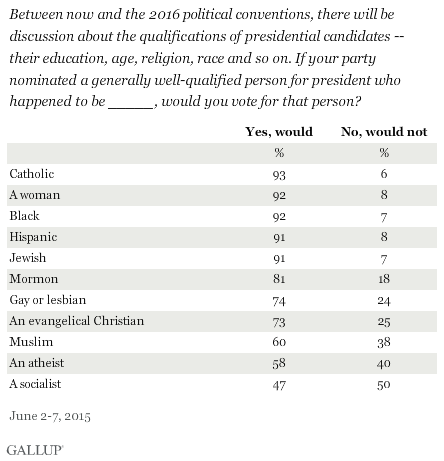At first glance, this headline is good news - especially if you care about the country's standard of living. However, the results of this Gallup survey seem to be a bit disturbing.
Take a look:

So socialists are least likely to be voted for, but remarkably 47% of survey respondents would still be willing to vote for self-avowed socialist. Enter... Bernie Sanders! The unabashed "democratic socialist" from Vermont, who is listed as an Independent only because he doesn't feel the democratic party goes far enough in controlling the U.S. economy, is polling very well in both Iowa and New Hampshire against Hillary Clinton.
Yesterday, the Wall Street Journal reported that if all of Bernie Sander's proposals were passed, the price tag would amount to some $18 Trillion over the next 10 years. Despite the number of zeros associated with this price tag, I'm still more surprised that 47% of Americans would be willing to vote for a socialist.
Socialism has been tried and tested and perhaps the greatest historical case against this type of economic system is the symbolism of the Berlin Wall. The wall was not built to keep free West Germans from sneaking into East Germany, but the wall was intended to keep East Germans from fleeing to West Germany. Similarly, at the DMZ on the North Korean/South Korean border, two North Korean soldiers stand facing each other with an order to shoot to kill if the other soldier attempts to defect to the south.
In fact, here is an empirical anecdote. Below is a satellite picture of the two Koreas at night (courtesy of camyx.com):

The figurative darkness associated with socialism extends far beyond North Korea. Perhaps those most affected by socialism are the poor. Here is some data that shows that in economies that become less free, the poor are most affected.
Here, poverty intensity is the "nature and intensity of deprivation at the individual level in education, health outcomes, and standard of living" and the chart shows that unfree economies have a poverty intensity rating that is nearly four times greater than economies that are generally free.
Other data show the GDP per capita is substantially greater for countries that are more economically free vis-a-vis countries that are unfree:

For those readers that would prefer to live longer lives - it turns out the economic freedom may also contribute to life expectancy:

And while Bernie Sanders can get a crowd going when he starts ranting about income inequality, it turns out that economic freedom has a negative effect on the level of income inequality as well. In fact, it was recently reported that despite an income per capita of a meager $14,000 per year in the Socialist country of Venezuela, the daughter of the late President Hugo Chavez is the richest person in that country with assets totaling more than $4 billion.
Listen, I would agree with most that crazy Uncle Bernie can give a good speech... But next time he starts hollering about how socialism will help the middle class, it seems that what he's really saying is that he hates poor people, he wants us all to have less money and to die young, and that income inequality really isn't that bad of a thing...
